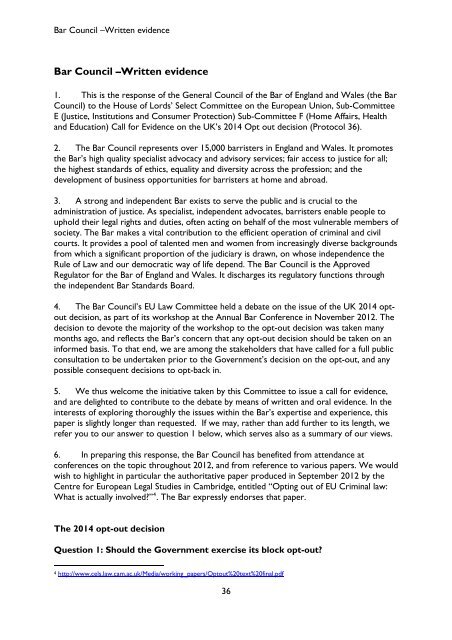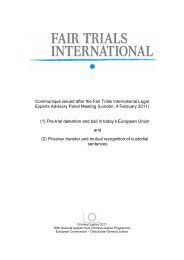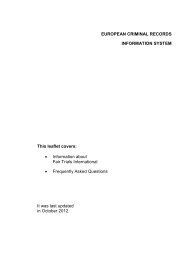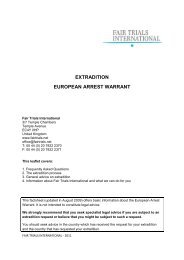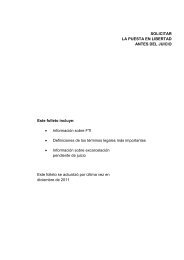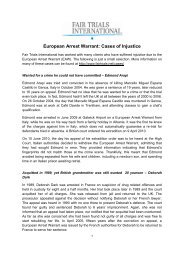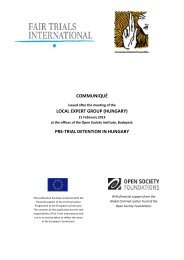The Association of Chief Police Officers - Parliament
The Association of Chief Police Officers - Parliament
The Association of Chief Police Officers - Parliament
You also want an ePaper? Increase the reach of your titles
YUMPU automatically turns print PDFs into web optimized ePapers that Google loves.
Bar Council –Written evidenceBar Council –Written evidence1. This is the response <strong>of</strong> the General Council <strong>of</strong> the Bar <strong>of</strong> England and Wales (the BarCouncil) to the House <strong>of</strong> Lords’ Select Committee on the European Union, Sub-CommitteeE (Justice, Institutions and Consumer Protection) Sub-Committee F (Home Affairs, Healthand Education) Call for Evidence on the UK’s 2014 Opt out decision (Protocol 36).2. <strong>The</strong> Bar Council represents over 15,000 barristers in England and Wales. It promotesthe Bar’s high quality specialist advocacy and advisory services; fair access to justice for all;the highest standards <strong>of</strong> ethics, equality and diversity across the pr<strong>of</strong>ession; and thedevelopment <strong>of</strong> business opportunities for barristers at home and abroad.3. A strong and independent Bar exists to serve the public and is crucial to theadministration <strong>of</strong> justice. As specialist, independent advocates, barristers enable people touphold their legal rights and duties, <strong>of</strong>ten acting on behalf <strong>of</strong> the most vulnerable members <strong>of</strong>society. <strong>The</strong> Bar makes a vital contribution to the efficient operation <strong>of</strong> criminal and civilcourts. It provides a pool <strong>of</strong> talented men and women from increasingly diverse backgroundsfrom which a significant proportion <strong>of</strong> the judiciary is drawn, on whose independence theRule <strong>of</strong> Law and our democratic way <strong>of</strong> life depend. <strong>The</strong> Bar Council is the ApprovedRegulator for the Bar <strong>of</strong> England and Wales. It discharges its regulatory functions throughthe independent Bar Standards Board.4. <strong>The</strong> Bar Council’s EU Law Committee held a debate on the issue <strong>of</strong> the UK 2014 optoutdecision, as part <strong>of</strong> its workshop at the Annual Bar Conference in November 2012. <strong>The</strong>decision to devote the majority <strong>of</strong> the workshop to the opt-out decision was taken manymonths ago, and reflects the Bar’s concern that any opt-out decision should be taken on aninformed basis. To that end, we are among the stakeholders that have called for a full publicconsultation to be undertaken prior to the Government’s decision on the opt-out, and anypossible consequent decisions to opt-back in.5. We thus welcome the initiative taken by this Committee to issue a call for evidence,and are delighted to contribute to the debate by means <strong>of</strong> written and oral evidence. In theinterests <strong>of</strong> exploring thoroughly the issues within the Bar’s expertise and experience, thispaper is slightly longer than requested. If we may, rather than add further to its length, werefer you to our answer to question 1 below, which serves also as a summary <strong>of</strong> our views.6. In preparing this response, the Bar Council has benefited from attendance atconferences on the topic throughout 2012, and from reference to various papers. We wouldwish to highlight in particular the authoritative paper produced in September 2012 by theCentre for European Legal Studies in Cambridge, entitled “Opting out <strong>of</strong> EU Criminal law:What is actually involved?” 4 . <strong>The</strong> Bar expressly endorses that paper.<strong>The</strong> 2014 opt-out decisionQuestion 1: Should the Government exercise its block opt-out?4 http://www.cels.law.cam.ac.uk/Media/working_papers/Optout%20text%20final.pdf36


